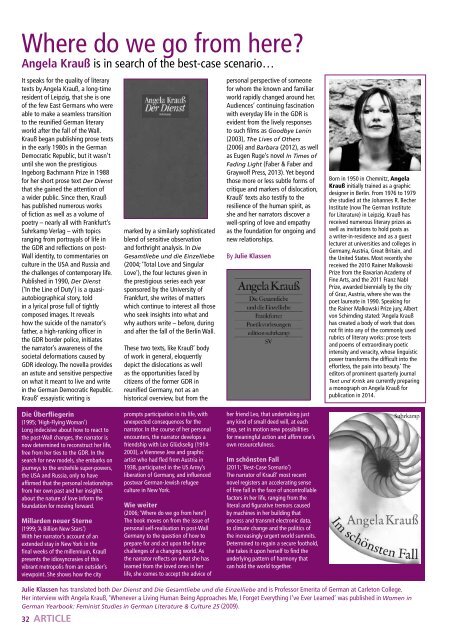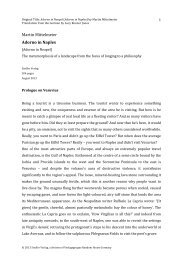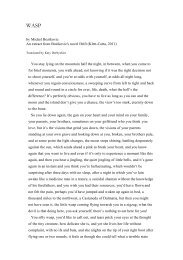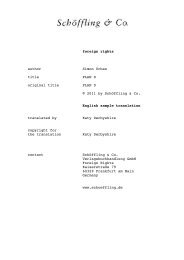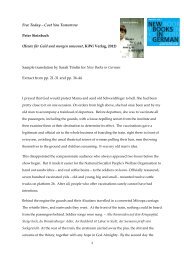issue 34 - New Books in German
issue 34 - New Books in German
issue 34 - New Books in German
You also want an ePaper? Increase the reach of your titles
YUMPU automatically turns print PDFs into web optimized ePapers that Google loves.
Where do we go from here?<br />
Angela Krauß is <strong>in</strong> search of the best-case scenario…<br />
It speaks for the quality of literary<br />
texts by Angela Krauß, a long-time<br />
resident of Leipzig, that she is one<br />
of the few East <strong>German</strong>s who were<br />
able to make a seamless transition<br />
to the reunified <strong>German</strong> literary<br />
world after the fall of the Wall.<br />
Krauß began publish<strong>in</strong>g prose texts<br />
<strong>in</strong> the early 1980s <strong>in</strong> the <strong>German</strong><br />
Democratic Republic, but it wasn’t<br />
until she won the prestigious<br />
Ingeborg Bachmann Prize <strong>in</strong> 1988<br />
for her short prose text Der Dienst<br />
that she ga<strong>in</strong>ed the attention of<br />
a wider public. S<strong>in</strong>ce then, Krauß<br />
has published numerous works<br />
of fiction as well as a volume of<br />
poetry – nearly all with Frankfurt’s<br />
Suhrkamp Verlag – with topics<br />
rang<strong>in</strong>g from portrayals of life <strong>in</strong><br />
the GDR and reflections on post-<br />
Wall identity, to commentaries on<br />
culture <strong>in</strong> the USA and Russia and<br />
the challenges of contemporary life.<br />
Published <strong>in</strong> 1990, Der Dienst<br />
(‘In the L<strong>in</strong>e of Duty’) is a quasiautobiographical<br />
story, told<br />
<strong>in</strong> a lyrical prose full of tightly<br />
composed images. It reveals<br />
how the suicide of the narrator’s<br />
father, a high-rank<strong>in</strong>g officer <strong>in</strong><br />
the GDR border police, <strong>in</strong>itiates<br />
the narrator’s awareness of the<br />
societal deformations caused by<br />
GDR ideology. The novella provides<br />
an astute and sensitive perspective<br />
on what it meant to live and write<br />
<strong>in</strong> the <strong>German</strong> Democratic Republic.<br />
Krauß’ essayistic writ<strong>in</strong>g is<br />
marked by a similarly sophisticated<br />
blend of sensitive observation<br />
and forthright analysis. In Die<br />
Gesamtliebe und die E<strong>in</strong>zelliebe<br />
(2004; ‘Total Love and S<strong>in</strong>gular<br />
Love’), the four lectures given <strong>in</strong><br />
the prestigious series each year<br />
sponsored by the University of<br />
Frankfurt, she writes of matters<br />
which cont<strong>in</strong>ue to <strong>in</strong>terest all those<br />
who seek <strong>in</strong>sights <strong>in</strong>to what and<br />
why authors write – before, dur<strong>in</strong>g<br />
and after the fall of the Berl<strong>in</strong> Wall.<br />
These two texts, like Krauß’ body<br />
of work <strong>in</strong> general, eloquently<br />
depict the dislocations as well<br />
as the opportunities faced by<br />
citizens of the former GDR <strong>in</strong><br />
reunified <strong>German</strong>y, not as an<br />
historical overview, but from the<br />
personal perspective of someone<br />
for whom the known and familiar<br />
world rapidly changed around her.<br />
Audiences’ cont<strong>in</strong>u<strong>in</strong>g fasc<strong>in</strong>ation<br />
with everyday life <strong>in</strong> the GDR is<br />
evident from the lively responses<br />
to such films as Goodbye Len<strong>in</strong><br />
(2003), The Lives of Others<br />
(2006) and Barbara (2012), as well<br />
as Eugen Ruge’s novel In Times of<br />
Fad<strong>in</strong>g Light (Faber & Faber and<br />
Graywolf Press, 2013). Yet beyond<br />
those more or less subtle forms of<br />
critique and markers of dislocation,<br />
Krauß’ texts also testify to the<br />
resilience of the human spirit, as<br />
she and her narrators discover a<br />
well-spr<strong>in</strong>g of love and empathy<br />
as the foundation for ongo<strong>in</strong>g and<br />
new relationships.<br />
By Julie Klassen<br />
Born <strong>in</strong> 1950 <strong>in</strong> Chemnitz, Angela<br />
Krauß <strong>in</strong>itially tra<strong>in</strong>ed as a graphic<br />
designer <strong>in</strong> Berl<strong>in</strong>. From 1976 to 1979<br />
she studied at the Johannes R. Becher<br />
Institute (now The <strong>German</strong> Institute<br />
for Literature) <strong>in</strong> Leipzig. Krauß has<br />
received numerous literary prizes as<br />
well as <strong>in</strong>vitations to hold posts as<br />
a writer-<strong>in</strong>-residence and as a guest<br />
lecturer at universities and colleges <strong>in</strong><br />
<strong>German</strong>y, Austria, Great Brita<strong>in</strong>, and<br />
the United States. Most recently she<br />
received the 2010 Ra<strong>in</strong>er Malkowski<br />
Prize from the Bavarian Academy of<br />
F<strong>in</strong>e Arts, and the 2011 Franz Nabl<br />
Prize, awarded biennially by the city<br />
of Graz, Austria, where she was the<br />
poet laureate <strong>in</strong> 1990. Speak<strong>in</strong>g for<br />
the Ra<strong>in</strong>er Malkowski Prize jury, Albert<br />
von Schirnd<strong>in</strong>g stated: ‘Angela Krauß<br />
has created a body of work that does<br />
not fit <strong>in</strong>to any of the commonly used<br />
rubrics of literary works: prose texts<br />
and poems of extraord<strong>in</strong>ary poetic<br />
<strong>in</strong>tensity and veracity, whose l<strong>in</strong>guistic<br />
power transforms the difficult <strong>in</strong>to the<br />
effortless, the pa<strong>in</strong> <strong>in</strong>to beauty.’ The<br />
editors of prom<strong>in</strong>ent quarterly journal<br />
Text und Kritik are currently prepar<strong>in</strong>g<br />
a monograph on Angela Krauß for<br />
publication <strong>in</strong> 2014.<br />
Die Überflieger<strong>in</strong><br />
(1995; ‘High-Fly<strong>in</strong>g Woman’)<br />
Long <strong>in</strong>decisive about how to react to<br />
the post-Wall changes, the narrator is<br />
now determ<strong>in</strong>ed to reconstruct her life,<br />
free from her ties to the GDR. In the<br />
search for new models, she embarks on<br />
journeys to the erstwhile super-powers,<br />
the USA and Russia, only to have<br />
affirmed that the personal relationships<br />
from her own past and her <strong>in</strong>sights<br />
about the nature of love <strong>in</strong>form the<br />
foundation for mov<strong>in</strong>g forward.<br />
Millarden neuer Sterne<br />
(1999; ‘A Billion <strong>New</strong> Stars’)<br />
With her narrator’s account of an<br />
extended stay <strong>in</strong> <strong>New</strong> York <strong>in</strong> the<br />
f<strong>in</strong>al weeks of the millennium, Krauß<br />
presents the idiosyncrasies of this<br />
vibrant metropolis from an outsider’s<br />
viewpo<strong>in</strong>t. She shows how the city<br />
prompts participation <strong>in</strong> its life, with<br />
unexpected consequences for the<br />
narrator. In the course of her personal<br />
encounters, the narrator develops a<br />
friendship with Leo Glückselig (1914-<br />
2003), a Viennese Jew and graphic<br />
artist who had fled from Austria <strong>in</strong><br />
1938, participated <strong>in</strong> the US Army’s<br />
liberation of <strong>German</strong>y, and <strong>in</strong>fluenced<br />
postwar <strong>German</strong>-Jewish refugee<br />
culture <strong>in</strong> <strong>New</strong> York.<br />
Wie weiter<br />
(2006; ‘Where do we go from here’)<br />
The book moves on from the <strong>issue</strong> of<br />
personal self-realisation <strong>in</strong> post-Wall<br />
<strong>German</strong>y to the question of how to<br />
prepare for and act upon the future<br />
challenges of a chang<strong>in</strong>g world. As<br />
the narrator reflects on what she has<br />
learned from the loved ones <strong>in</strong> her<br />
life, she comes to accept the advice of<br />
her friend Leo, that undertak<strong>in</strong>g just<br />
any k<strong>in</strong>d of small deed will, at each<br />
step, set <strong>in</strong> motion new possibilities<br />
for mean<strong>in</strong>gful action and affirm one’s<br />
own resourcefulness.<br />
Im schönsten Fall<br />
(2011; ‘Best-Case Scenario’)<br />
The narrator of Krauß’ most recent<br />
novel registers an accelerat<strong>in</strong>g sense<br />
of free fall <strong>in</strong> the face of uncontrollable<br />
factors <strong>in</strong> her life, rang<strong>in</strong>g from the<br />
literal and figurative tremors caused<br />
by mach<strong>in</strong>es <strong>in</strong> her build<strong>in</strong>g that<br />
process and transmit electronic data,<br />
to climate change and the politics of<br />
the <strong>in</strong>creas<strong>in</strong>gly urgent world summits.<br />
Determ<strong>in</strong>ed to rega<strong>in</strong> a secure foothold,<br />
she takes it upon herself to f<strong>in</strong>d the<br />
underly<strong>in</strong>g pattern of harmony that<br />
can hold the world together.<br />
Julie Klassen has translated both Der Dienst and Die Gesamtliebe und die E<strong>in</strong>zelliebe and is Professor Emerita of <strong>German</strong> at Carleton College.<br />
Her <strong>in</strong>terview with Angela Krauß, ‘Whenever a Liv<strong>in</strong>g Human Be<strong>in</strong>g Approaches Me, I Forget Everyth<strong>in</strong>g I’ve Ever Learned’ was published <strong>in</strong> Women <strong>in</strong><br />
<strong>German</strong> Yearbook: Fem<strong>in</strong>ist Studies <strong>in</strong> <strong>German</strong> Literature & Culture 25 (2009).<br />
32 Article


